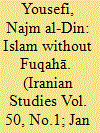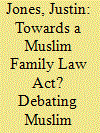| Srl | Item |
| 1 |
ID:
151448


|
|
|
|
|
| Summary/Abstract |
This paper seeks to advance the existing scholarship on Persian secretary and belles-lettrist, ʿAbd Allāh Ibn al-Muqaffaʿ (d. 139/757) and his Risāla fī ’l-Ṣaḥāba (Epistle Concerning the Entourage). It argues that the Risāla, addressed to the second Abbasid caliph al-Manṣūr, set out to tackle the political ills of the caliphate, especially the crisis of political legitimacy. As the first documented articulation of the Islamic polity, the Risāla made a series of recommendations, including a proposal for legal codification that attempted to reinvent the caliphate by reuniting the institution's political and legal authority at the expense of private jurists (fuqahāʾ). The paper illustrates how Ibn Muqaffaʿ’s solution relied on a creative integration of Iranian and Islamic ideas of statecraft and legitimate rule. Ironically, this creative integration may have played a part in the Risāla’s failure to garner necessary support to effect change.
|
|
|
|
|
|
|
|
|
|
|
|
|
|
|
|
| 2 |
ID:
171861


|
|
|
|
|
| Summary/Abstract |
Muslim personal laws in India have never been systematically codified, in marked contrast both to Hindu family laws in India and to Islamic family laws in much of the Muslim-majority world, both of which have been subject to a far greater degree of codification. This article examines the call being made by one prominent contemporary Muslim women's organisation, the Bharatiya Muslim Mahila Andolan (BMMA), for the wholesale codification of Muslim family laws in India as a pathway to protecting women's rights. Following a discussion of the wider context of India's uncodified Muslim personal law system, this paper offers a commentary on the BMMA's draft Family Law Act, first released in 2014. It demonstrates how this document synthesises discourses of women's rights drawn from a series of Qur’anic, constitutional and transnational reference points. By drawing from such diverse sources, and while legal codification in much of the Islamic world has instituted fundamentally patriarchal legal norms, the BMMA's proposed code articulates a distinctive, more gender-equal reading of Islamic family law.
|
|
|
|
|
|
|
|
|
|
|
|
|
|
|
|